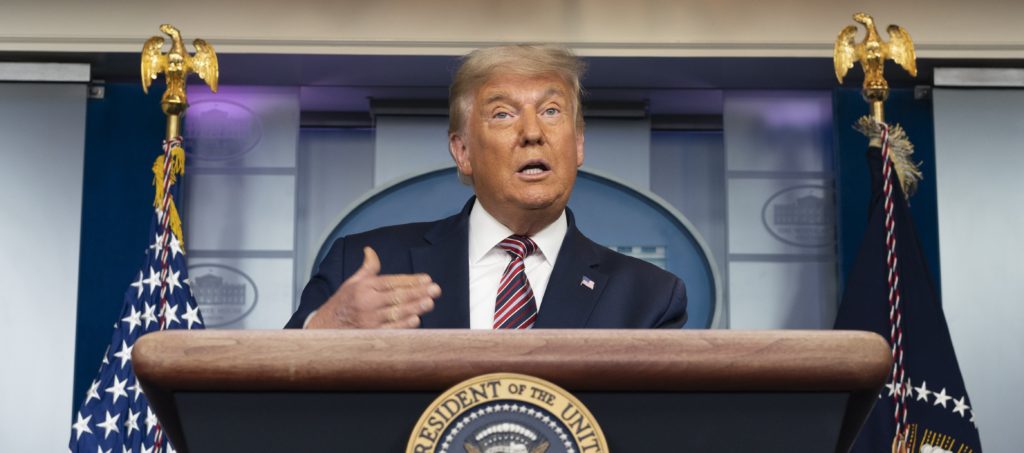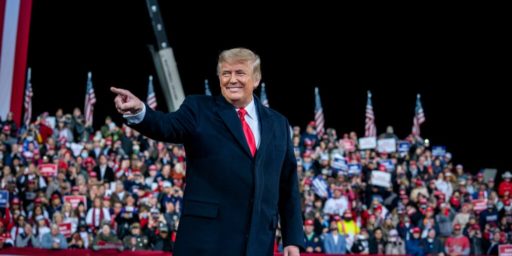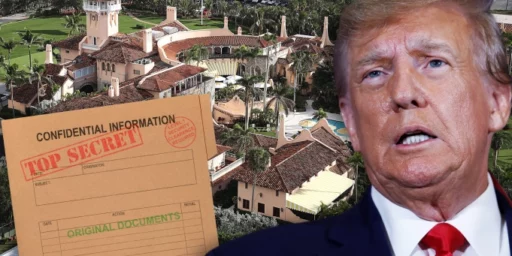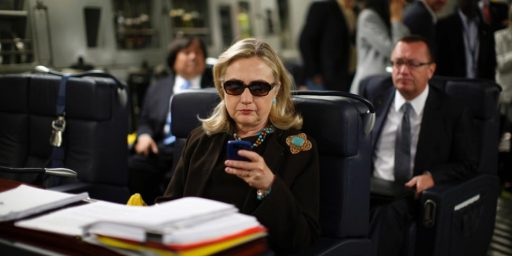Myths of Presidential Impunity
While enormous, the commander-in-chief's control over state secrets is not absolute.

Writing at Just Security, J. William Leonard dispels some “Myths & Misunderstandings Relating to Mar-a-Lago Documents Investigation.” Having “spent over 30 years overseeing the proper handling of such information, initially in the Department of Defense and ending [his] government service responsible for the oversight of classified information within the entire executive branch as Director of the Information Security Oversight Office,” he’s eminently qualified to do so.
I want to highlight two of them, in that I’ve at least partly helped perpetuate them here:
Myth #2: As long as information has been declassified by competent authority or is otherwise unclassified, former government officials (to include a former president) are free to possess and/or disclose the information at will.
False. Much of the unclassified information created by the federal government’s executive branch or otherwise in its custody is nonetheless sensitive and requires safeguarding or dissemination controls pursuant to and consistent with applicable law, regulations, and government-wide policies. Known as Controlled Unclassified Information, examples include information relating to federal taxpayers, witness protection, critical infrastructure protection and nuclear security. Both current and former government officials are subject to administrative or criminal sanctions should they improperly disclose or otherwise mishandle such unclassified information. Moreover, the unauthorized possession of certain controlled unclassified information such as Naval Nuclear Propulsion Information could be subject to prosecution under, among other statutes, 18 USC 793 of the Espionage Act, which does not mention classified information but rather applies to closely held national defense information the disclosure of which, if publicly known, could be used to the injury of the United States or to the advantage of any foreign nation.
The Controlled Unclassified Information (CUI) category was created by President Obama in 2009 but only recently came into widespread use in the Defense Department. When I first started undergoing the training for it, it seemed like an oxymoron that was aimed at even further exacerbating the long-known problem of overclassification. But its intent is the opposite. Rather than willy-nilly marking documents For Official Use Only, CUI requires marking specific paragraphs that contain controlled information so that it can be evaluated to see whether control is justified.
Of course, if Trump simply willy-nilly declassified boxes of documents, he almost certainly didn’t have them marked up with CUI.
But Leonard points to an aspect of national security law with which I wasn’t familiar until the last few days: the fact that certain information related to our nuclear programs is controlled outside of the formal classification process—and therefore outside of the President’s ability to declare declassified.
Myth #3: The President possesses the “absolute authority” to declassify information at will.
Partly true, partly false. During and after his presidency, Trump has repeatedly made this claim. It is true that the president’s authority to classify and thus declassify information in the interest of national security derives from his Article II constitutional authority as commander-in-chief and the position of chief executive responsible for foreign relations. A Supreme Court decision — Department of the Navy v. Egan — is often used to assert unchecked presidential authority over classified information. However, there is information which is “classified” not pursuant to the president’s Article II authority but rather pursuant to statutory law. For example, the Atomic Energy Act of 1954 as amended (AEA) states that “all data concerning (1) design, manufacture, or utilization of atomic weapons; (2) the production of special nuclear material; or (3) the use of special nuclear material in the production of energy” is effectively “born classified” unless officially “declassified or removed from the Restricted Data category” in accordance with the Act. Unlike national security information classified pursuant to the president’s executive authority, information classified by the AEA is not subject to automatic or unilateral declassification by a president but rather requires review prior to the removal of classification safeguards.
Another example is when an allied or friendly nation does not want revealed the fact that they have shared extremely sensitive information with the U.S government. Unless the United States can convince a partner nation that their information can be adequately protected, they may be dissuaded from sharing it, thus placing the United States and its citizens at increased risk. To facilitate exchanges of such information, the United States has entered into a number of legally binding agreements with foreign governments.
A notable example of Trump’s violation of such an agreement dates from early in his administration when reports surfaced that Trump had in an Oval Office meeting disclosed to Russian Foreign Minister Sergey Lavrov and the Russian Ambassador Sergey Kislyak highly classified information which had been shared by a U.S. ally (reportedly Israel) and concerned an Islamic State terrorist operation. Trump’s alleged disclosure would have run afoul of the General Security of Miliary Information Agreement between the United States and Israel (similar to agreements with many other allied and friendly governments) which states in part with respect to “classified information communicated directly or indirectly between our two governments … the recipient government will not release the information to a third government or any other party without the approval of the releasing government.” While the president is free to repudiate this executive agreement, there is no indication that this was Trump’s intent or that he did so – indeed, it remains in effect to this day.
Whether anything in the boxes seized by the FBI falls into these categories remains to be seen. But commentators, like myself, who understand the handling of state secrets solely through the classification system used by DOD and most other Executive agencies overstate the power of the President to decide. It remains the case that the President has essentially unlimited power to declassify or share damn near any information that he possesses. But there are limited and important exceptions.






This was what I was trying–and, clearly failing–to convey in earlier comments. In addition to the nuclear statutes, I believe there are also statutes that protect the identities of intelligence officers. My understanding is that the President’s authority on this matter flows from Executive Orders, but that anything statutory would flow through Congress.
@Jen:
True, and I repeatedly made the same point, even citing the Atomic Energy Acts.
But unless you’re identifiable here as an aging man leaning on appeals to unseen credentials (“I was an Intel officer! I DRIVE A DODGE STRATUS!”), it can’t possibly be the case that you might know what you’re talking about.
The declassification argument is a huge red herring anyway. It’s basically a confession that Trump took documents containing state secrets to his home, for his own purposes. Whether or not her “declassified” them is relevant only to what various statutes he breached in doing it. It’s not relevant to the basic and underlying corruption.
Yes, some categories of nuclear-related information are classified by statute. I mentioned that last Friday. That is a niche exception.
Secondly, as you allude to, CUI was created to standardize the mish-mash of unclassified dissemination controls and related agency policies that were being used throughout the Executive branch. This covers everything from privacy act information, to law enforcement information to contracting information to internal policies and other things that are exempt from mandatory disclosure. But this is a system of dissemination control, not classification.
That’s a good point that I had forgotten about. This is called FGI – foreign government information – and it is restricted by statute – see 32 CFR § 2001.54.
Outside of these two niche exceptions, Mr. Leonard reiterates the point I’ve been making here, which is that President does possess the absolute authority to declassify information.
And I can probably go back into the archives here and find comments I made long ago which suggested that Congress ought to be a lot more involved in classification policy than it certainly is. Because that’s been my view for a long time, and the Trump Presidency is a good example of why.
@DK:
Ah yes, DK with the ad hominem again.
As a point of fact, I am not relying on my credentials. I’m relying on over two decades of actual experience with the subject matter. I don’t pull out my “I’m an expert” card very often, but I do when it comes to this topic, and intelligence matters generally because I do actually have the requisite experience.
What experience do you have, or has your expertise developed over the past week via Google?
@Andy:
I don’t believe that is correct–I believe it’s anything that is statutorily defined, which would include things like the Intelligence Identities Protection Act.
I am not a lawyer, but this seems to be a separation of powers argument. If the President’s power to declassify information is derived from an Executive Order, I don’t think that would supersede protections passed under statute.
I seriously doubt that he “willy-nilly declassified boxes” of anything, but I suspect that he might have lied about doing it based on “well I intended to; sameo-sameo.” Beyond that, the notion of needing to re-mark declassified documents is well beyond FG’s levels of understanding and sophistication in handling sensitive materials. Lots of people are saying that the markings are printed in “smart ink” that automatically reacts to the voice of the President. Lots of people. I’ve heard it myself.
Certainly whatever President’s ability to act on a spot decision to declassify information seems pretty unlimited to this little cracker given that there is no “double naught”/license to kill Mossad agent in the room during meetings to enforce the General Security of Miliary Information Agreement by whatever means are necessary.
Of course, such behavior would be grounds for impeachment, so I’m ABSOLUTELY positive that no President would ever breach such an agreement. Right?
“…statutes that protect the identities of intelligence officers.”
Valerie Plame comes to mind for some reason, but in the fog of collective lack of memory, I can no longer remember why.
@Andy: The thing you aren’t addressing is that the DOJ, under Trump, successfully argued in court that just because Trump said, in a tweet, that “everything in the Russian investigation is declassified” it doesn’t mean that everything in the Russia investigation is declassified.
This is a court case.
Also, it seems to me that disclosure is not the same as declassification. That is, the President can decide to disclose something at any time to any person – unless statutorily restricted, such as the material under Sec. 793. (And it seems very likely that he possessed material that is restricted under Sec. 793)
But to “declassify” you have to tell people you’ve done it. They need to know. Things need to be updated. There’s no such thing as a “secret declassification”, I would think.
And of course, regardless of their Classified status, the documents aren’t his. He stole them.
One detail that stood out to me is that one of the boxes taken was “leatherbound”. Wha? Pretty sure the US Gov doesn’t make or use leatherbound doc boxes. Seems mighty suspicious. You know, this is the box with the good stuff…
@Jay L Gischer: I pointed this out last Friday, even referencing the nat sec lawyer Bradley Moss, who went into detail in his tweet thread.
Cheryl Rofer said my understanding was by and large correct, which I’ll take as she’s got some experience in these issues.
As is usual with Trump, no one has expertise when it comes to his breaking of norms. We’re all trying to process it on the fly for the first time and apply laws and policies in ways that we never expected to have to do. We (the sane ones, at least) know what he did was wrong, but unfortunately, we have to play these games in order to figure out what to do next, including decide whether it’s a criminal act. The GOP and his defenders latch onto any little line of reasoning to try to excuse it all. It’s so frustrating and tiresome.
Added: I went back and forth on twitter a little bit with a Trumpy who insisted that since Clinton wasn’t charged with a crime for “butter emails”, surely it’s not fair to treat Trump differently. Exhausting.
I kind of feel it appropriate to quote from Disney’s Alice in Wonderland:
Queen of Hearts : Now… are you ready for your sentence?
Alice : Sentence? But there has to be a verdict first…
Queen of Hearts : Sentence first! Verdict afterwards.
Alice : But that just isn’t the way…
Queen of Hearts : [shouting] All ways are…!
Alice : …your ways, your Majesty.
She’s positively trumpian.
@Andy:
Ah, yes, Andy with the self-centered hypocrisy again, assuming the world revolves around him and launching the same ad hominem he thinks he abhors. Gurl, bye.
In fact, your name appeared nowhere in my comment. Blame your guilty conscience, then see the lyrics to the chorus of Carly Simon’s “You’re So Vain” for how this works.
Self-awareness is not your strong suit.
None of your business. Again, it’s clear you think you’re super special, but I don’t know you, and I don’t have to prove myself to you.
You would think a so-called expert in national security would know better than to assume the expertise level of a total stranger online. In fact, belying your arrogant insistence you know everything, you actually don’t know who I am, what I’ve done or who I know. Unlike you, I don’t feel the need to overcompensate by screaming “I DRIVE A D9DGE STRATUS” online every other day.
But, if my expertise came from Google, that would not bode well for your alleged twenty years working the phones, since I was right from the beginning that 1) the president’s so called plenary declassification powers are not plenary and that 2) Trump is a thug, a criminal, and a liar whose account no sensible person would trust over Merrick Garland.
If a Googler could figure that out while you were, per usual, confusing reflexive contrarionism with critical thinking, so much for expertise.